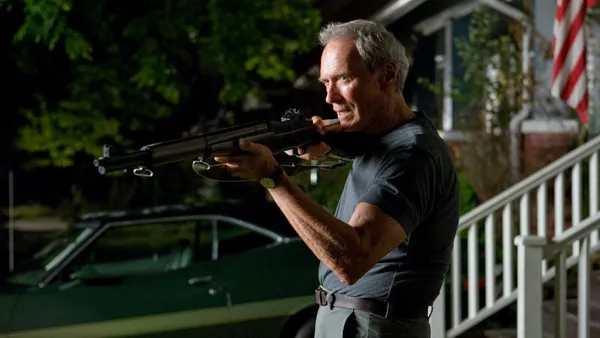Eye For Film >> Movies >> Gran Torino (2008) Film Review

Gran Torino is old-fashioned film making, a masterpiece of craft, finely tuned and polished. While its innovations are slight, the effort and judgement displayed are enough to make it one of Eastwood's better works. It is a fitting end to his acting career, testament to his skill as director, and an excellent display of a variety of talents. They do, it seems, still sometimes make them like they used to.
Eastwood is Walt Kowalski, a Korean War veteran, a former Ford employee, an isolated father and widower, alienated from the world around him. He's a racist old man, certainly, but the film doesn't seek to excuse him. This may be a film about redemption, but it isn't necessarily one that forgives.

Walt's family are a disappointment to him. The amazingly similar looking Brian Haley and Brian Howe are his sons, themselves fathers to grandchildren that are alien to Walt, disrespectful at their grandmother's funeral, even less willing to treat him as a person rather than an obligation. It's easy to see how the Kowalskis grew apart, even to see the why of it, but that makes it no less tragic.
It is at the funeral that Walt is challenged by Father Janovich, the parish's new priest, who provided comfort to Mrs Kowalski before she passed. Christopher Carley manages to convince as a new model Catholic priest, naive and inexperienced, but well meaning. Walt's wife extracted a promise from the young Father Janovich that he would take his confession. Kowalski's irascible nature and Janovich's youthful persistence force the two into conflict. When they discuss Walt's time in Korea it becomes clear that they don't understand each other: one is trying to avoid the subject; the other to empathise; without common ground they are talking past each other.
After the funeral, there is a confrontation involving Kowalski's neighbours, and it's here that he (and the audience) meet Thao and Sue Lor, members of the area's Hmong community. The Kowalskis were the last 'Americans' in the neighbourhood, replaced by wave after wave of immigrants. After Walt runs off a gang threatening Thao, he becomes a hero to the community. As Sue reaches out to Walt in friendship we start to learn why.
Ahney Her is excellent as Sue, straddling her parent cultures; the Hmong tribes of the Vietnamese highlands and the America her parents moved to after the war. As she explains, her people are traditional, as set in their ways as Kowalski is. Over a series of initially uncomfortable meetings he discovers how much he has in common with the Hmong, how much he has missed because of his retreat. When he takes on the task of 'manning up' her brother Thao it's hard to read his motivations, all the more because they change. Eastwood is actor enough to show us Kowalski starting to engage with the world, to grow if not to change himself.
Walt's interactions have the air of ritual. His racism is real, uncomfortably so, but it's born of his discomfort, his need for order, his experiences and his inexperience. His refusal to engage, perhaps a product of his fear of empathising with those he fought and killed in Korea, left him isolated. It's unpleasant, even when it is part of male bonding, understandable, though only in that Walt's reasons speak to his weaknesses. When he is challenged, by Janovich and Sue, he reacts, responds. His attitudes are a product of ignorance, and as he learns his attitudes change. Not completely, but enough to give him something approaching peace.
Walt's two confessions are powerful, honest, affecting. The reactions of those who hear them similarly telling. The twin elements of routine and ritual are vital to the film. It seems in part a film trapped in the Fifties because that is the world Walt has made for himself.
There are tropes at work here, even things that are near stereotypes, but the reason these features have become standards is because when they are well done they work well. Here they are executed perfectly. This is a simple story, at first apparently broadly brushed, but behind those seemingly clumsy strokes are fine details. Craftsmanship is an important concept; pride in a job well done. Every moment works towards the whole. While there is humour, sadness, drama, it all serves to illuminate Walt's situation, his journey, his adoption of the Lors as a surrogate family, or indeed theirs of him. Nick Schenk and Dave Johannson's script is a robust blueprint, the performances are uniformly excellent, but Eastwood's execution is what completes the film.
Reviewed on: 26 Feb 2009

















